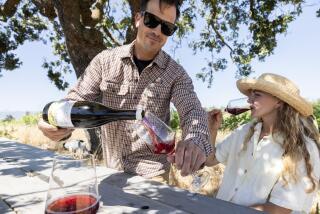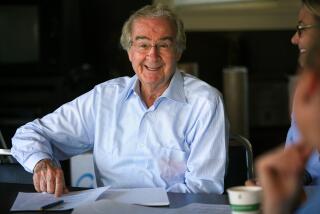Andre Tchelistcheff: An Appreciation
News of the death of pioneer winemaker Andre Tchelistcheff in Napa Valley last Wednesday profoundly saddened the wine world.
The news was not unexpected. Months ago, the diminutive, deep-voiced aristocrat, still seemingly hale and hearty--despite his 92 years--and working a schedule that might fatigue anyone half his age, was diagnosed with cancer of the esophagus. Even the torturous rigors of radiation did not stop his vineyard and winery routines. But his return to the hospital last week, to undergo surgery for the removal of a stomach tumor, was more than he could endure.
âUntil the last day,â his widow, Dorothy Tchelistcheff, told me, âhis mind was fighting. When it became inevitable that he would lose, after receiving last rites from a Russian Orthodox priest, he told me: âI am ready to go. I am wanting to go.â
âHe was so peaceful. He was ready.â
*
I first met Tchelistcheff 55 years ago, over lunch at Beaulieu Vineyards just after the harvest of 1939, only one year after his arrival from Paris.
He was born in 1901, the son of an anti-czarist judge and law professor from Kaluga Province, Russia, and attended the military academy of Kiev. He was still in his teens when the Bolshevik Revolution ripped his country apart. His father had served in the Provisional Government after the czar was deposed, and the Bolsheviks declared the family to be enemies. Tchelistcheff joined the White Russian Army and traveled with them to the Crimea in 1918.
From there, he and his family escaped to Turkey, then to Yugoslavia. After he reached Czechoslovakia, he finished his civil education at the Institute of National Agronomy in Brno. After five years of work and study, he earned a degree as an âengineer-agronomist.â
In the early â30s, he moved to Paris and chose the way of the vine, becoming assistant in viticulture and enology to the director of the Institute of National Agronomy. It was here, in the spring of 1938, that he met Georges de Latour, the French-born founder of Napa Valleyâs Beaulieu Vineyards, who had come to France seeking a new winemaker. The director of the school told de Latour that he had just the right young man for the job--highly intelligent, skilled and talented. It was, of course, Tchelistcheff.
*
Imagine, if you can, the reactions of this ardent young European-trained winemaker when he first came to Beaulieu. Here he was in this new and alien vineyard, the autumn colors of the lush Napa Valley all around him. The luxurious canopies of vines were nothing short of awesome, as was the backdrop of the tree-covered Mayacamas Mountains bordering the vineyards. The intensity and taste of the grapes was stunning.
But inside the winery, the scene was different. He shook his head and knew he would have to make changes if the transformation of those grapes into wine would carry the superb essence of the fruit.
In 1948, when we were together in the winery at Beaulieu tasting his 1946 Pinot Noir, a wine that would become the benchmark Pinot Noir for California, he told me this story:
âI could not find the French Burgundy taste or perfume in the wines made in the cellar before I came here,â he said. âCapt. Joe Concannon of Livermore was visiting, and I asked him about this grape in California. He spoke to me directly.
â âYoung man,â he said, âas the sun sets, go into the garden of Madame de Latour and pick one of her fine red roses, just as it has begun to open. Take it home. Put it into a vase . . . without water. Next morning, put your nose into the heart of that dying rose. Inhale the unique perfume. There you will have the scent to guide you to a perfect Pinot Noir.â That was it.â
*
As I swirled my glass of that 1946 Pinot Noir, a bouquet I can remember to this day, my eyes found it to be translucent. My nose found the perfume of those dying rose petals. My taste buds detected its long-lasting savors, wholly unlike Cabernet or Zinfandel. âItâs silky . . . and aristocratic,â I told him.
âIt has great elegance . . . and structure,â he said, calmly and accurately.
But as the science of enology steadily advanced, the language of laboratory technology invaded the social scene, and Tchelistcheff saw the single emphasis of grape varietals and technology threatening the aesthetics of winemaking.
âImagination,â he told me once, âcan become lost in the scientific process, but not when there are deep feelings of love. There is no love unless there is imagination . . . and no imagination without love.â
More to Read
Sign up for Essential California
The most important California stories and recommendations in your inbox every morning.
You may occasionally receive promotional content from the Los Angeles Times.










